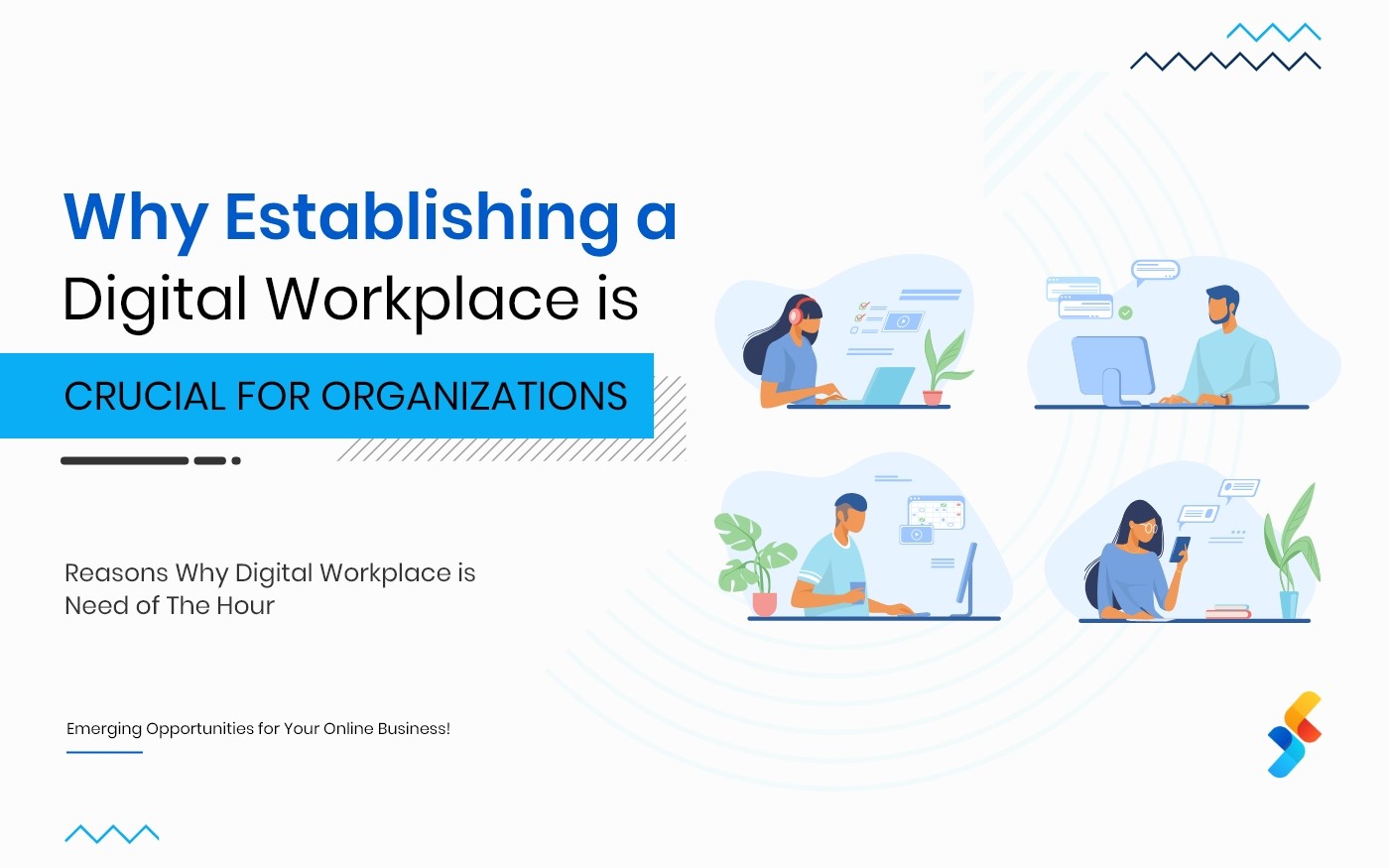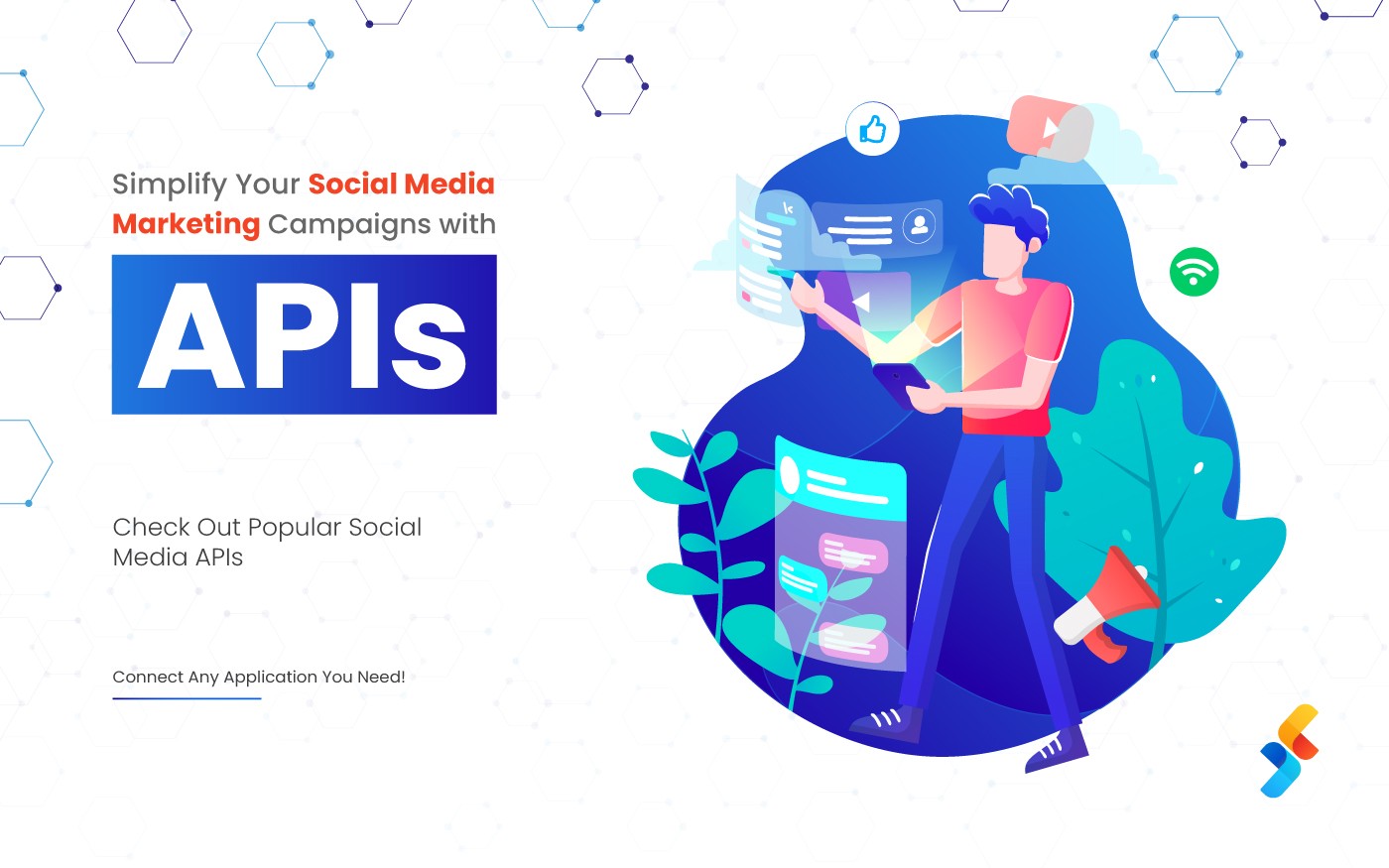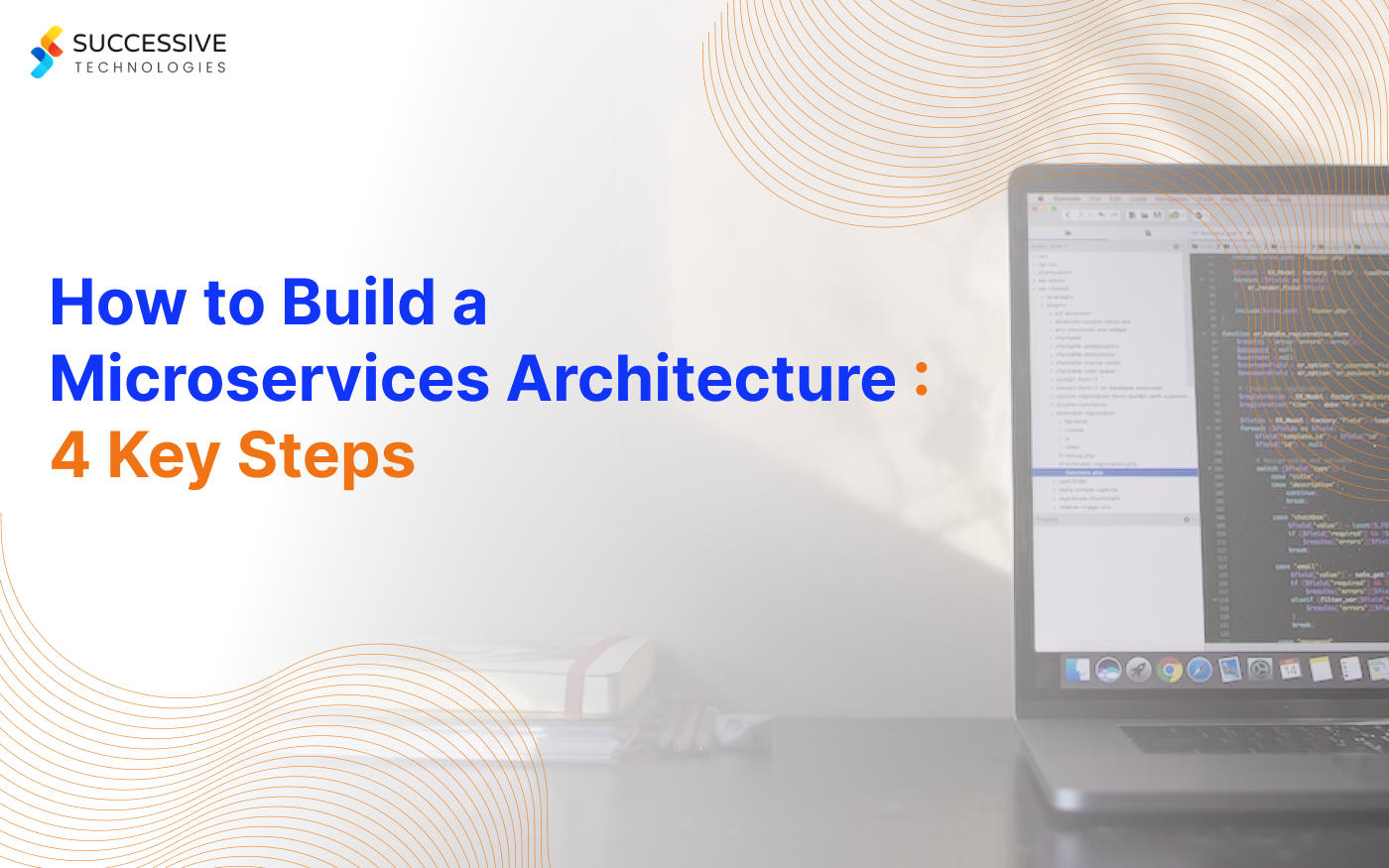Today, customer experience is everything. Enterprises rely on their web and mobile applications to captivate and engage customers and earn revenue.
But even with the best code quality and user interface design, your application can fail to perform as expected — if you haven’t built it using the right database.
Managing the database in web applications is a critical part of software development and administration. Databases make sure that application data is stored and organized properly, and that it can be processed and retrieved quickly in response to a user’s request. They also ensure that your sensitive business data is kept absolutely secure. This is especially important for organizations that deal in large quantities of data, such as eCommerce stores, social media platforms, online applications, etc.
To ensure that their applications are fast, reliable, and secure, enterprises need to carefully select the right database for their requirements. But there are a lot of different databases in the market, and it can be hard to know which database features are most important for your enterprise application.
In this article, we’ll look at what a database is, how to choose one, and the 10 best database options for web applications.
What is a database?
A database is a place on a computer or cloud system where an application’s data is collected and organized. Database management in web applications is done using a database management system (DBMS).
Databases serve several purposes, such as:
- Creating, storing, updating, and managing data
- Executing queries
- Making quantitative estimations
- Displaying refreshed data
- Restricting access to data based on predefined criteria
Estimated at USD 31.154 billion in 2021, the Global Enterprise Database Management System (DBMS) Market is projected to reach USD 124.728 billion by 2028, growing at a CAGR of 21.92 percent.
Also Read – 7 Reasons Why Node.js Is Perfect for Enterprise Development
How to choose your database
Depending on your industry, business model, and several other factors, your enterprise application will have a unique set of requirements. Different kinds of databases are best suited to different business requirements.
There are two main types of databases: SQL (Structured Query Language) and NoSQL. SQL databases are relational databases, with a relational structure. These are good for handling structured data. NoSQL databases don’t have a relational structure. These are good for storing unstructured data types.
Types of databases: SQL vs. NoSQL
| SQL | NoSQL |
| Mix of open-source and proprietary | Open-source |
| Have a relational structure | Don’t have a relational structure |
| Best suited for handling structured data | Best suited for handling semi-structured and unstructured data |
| Vertically scalable | Horizontally scalable |
| Generally mature and proven products | Still maturing |
| MySQL, PostgreSQL, Oracle | MongoDB, Firebase, Cassandra |
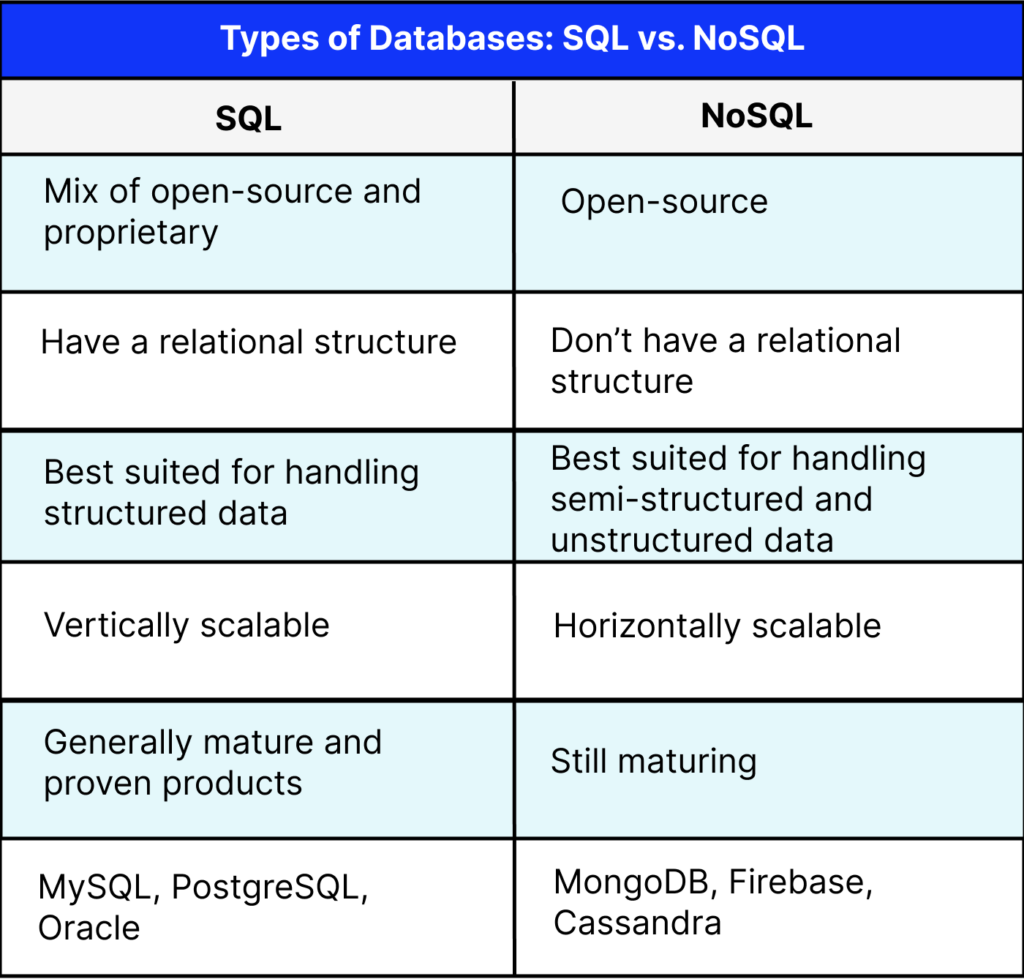
Businesses have long relied upon SQL systems for managing the databases in web applications, particularly in the case of traditional, monolithic applications. But as microservices, cloud and distributed apps become more popular, there are now more NoSQL options available.
But to know which one is best for your enterprise, you need to consider various factors, including the structure, size, and scalability requirements of your application.
Here are some of the questions you should consider when choosing a database for your application.
- What kind of data structure does your database need?
- What’s the total amount of data you expect your application to store?
- What’s the maximum number of users you expect to be using your application simultaneously?
- Where are your users located?
- Do you have any preferred programming languages?
- What are your requirements around application availability, latency, and scalability?
- What is your budget, and does it allow for software licences and support contracts?
- What are your data security requirements?
- What third-party tools and services do you need to integrate with your database?
Read Launching Web Apps with Flutter: A Comprehensive Guide
10 best database options for web applications
According to the 2022 Stack Overflow Developer Survey, which received over 70,000 responses, MySQL is the most popular database among those learning to code, while PostgreSQL is the most loved database among professional developers.
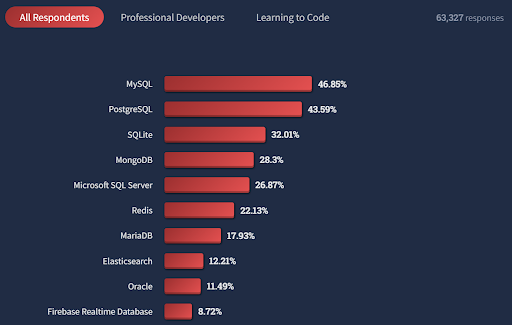
Top 10 databases according to the 2022 Stack Overflow Developer Survey (Source: Stack Overflow) [image link]
Let’s take a closer look at the 10 best database options for web applications in their order of popularity.
1. MySQL
MySQL is an open-source relational database management system developed and maintained by Oracle. It’s one of the most popular databases, used by 46.85 percent of the respondents to the 2022 Stack Overflow developer survey. Among relational databases, MySQL is one of the best database options for web applications.
Built using C and C++, MySQL is known for being extremely reliable and mature. It has a wide range of features and regularly updated versions. It also offers cross-platform support and a security layer for sensitive data.
MySQL is the database of choice for many large organizations such as Facebook, Twitter, Verizon, and more. It is also the preferred database for the development of custom web applications built using WordPress, Drupal, and Joomla.
2. PostgreSQL
PostgreSQL is the second most popular database, used by 43.59 percent of survey respondents.
Developed in C, PostgreSQL is an SQL-based relational database management system used for web and mobile application development. It is an open-source database, built by members of the developer community.
PostgreSQL is easy to learn and adapt. It offers enterprise-class features and can handle a wide variety of requirements. It supports Java, Python, C#, C, C++, Ruby and other languages. It also supports SQL for relational queries as well as JSON for non-relational queries.
3. SQLite
SQLite is an open-source relational database management system used by 32.01 percent of respondents. It is written in C. Rather than a standalone database, SQLite is a library that comes bundled with many mobile phones and computers, and can be embedded in applications.
SQLite comes with a core API that is small and easy to use even for beginners. It has no external dependencies, and can support terabyte-sized databases.
4. MongoDB
MongoDB is a document-oriented open-source database that is based on the NoSQL system. Released in 2009, it is used by 28.3 percent of the survey respondents.
MongoDB makes it easy to manage document data with no need for any additional apps. Using MongoDB, developers can create multiple databases and document collections with varying fields and data structures.

MongoDB University offers free courses for developers at beginner, intermediate, and advanced levels [image link]
MongoDB is one of the best database options for web applications when it comes to NoSQL systems. It is easy to learn and use, and a great choice for building high-availability, horizontally scaling apps. It supports several programming languages and application development platforms.
5. Microsoft SQL Server
Microsoft SQL Server is based on the SQL query language. It comes in several different editions with varying features.
MS SQL Server is particularly suited for breaking down data silos and producing valuable insights, making it a good choice for applications involving transactional processing, business intelligence, and analytics. It also enables comprehensive application development and offers excellent security and authentication features.
6. Redis
Redis or Remote Dictionary Server is an open-source database as well as an intelligent caching system. It supports many different data structures such as lists, strings, bitmaps, maps, streams, and more.
Besides being a database and cache, Redis can also be used as a message broker and streaming engine. It also offers geospatial features and hyper logging.
7. MariaDB
MariaDB is an RDMS that’s compatible with MySQL. It is often used to replace MySQL servers.
MariaDB offers columnar storage, which provides advantages for certain kinds of data. It has a massively parallel distributed data architecture, which makes it easy to work with large data sets involving petabytes of data.
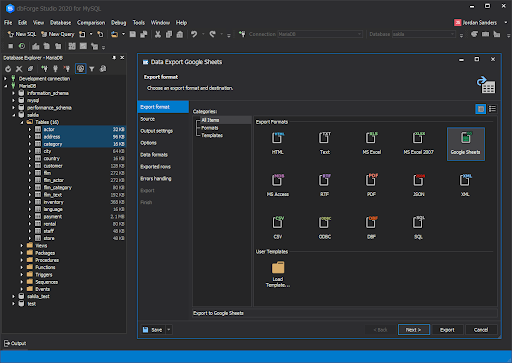
Graphical clients like dbForge Studio can be used for MariaDB database administration (Source: MariaDB) [image link]
MariaDB is built by a large community of developers who are also available to help resolve any challenges that new developers might face.
8. Elasticsearch
Elasticsearch is built on the open-source Java library Lucene. It is an open-source full-text search engine.
Elasticsearch can store and index data in JSON format. It has multi-tenant capabilities and a REST API. It is known for its horizontal scalability via automatic sharing and its REST API.
9. Oracle
Oracle is one of the most widely used databases. It supports all kinds of data types including structured, unstructured, graph, and more.
Oracle offers built-in support for Java, C, and C++. It’s flexible and scalable, and allows faster processing while consuming less space than other databases.
Oracle is a good choice of database for businesses that need to optimize costs without sacrificing performance.
10. Firebase
Backed by Google since 2014, Firebase is a popular NoSQL database. With client libraries, security rules, and support for online mode, Firebase offers an extensive ecosystem for developing web and mobile applications.
Firebase works well across devices and is an excellent choice for building real-time apps such as gaming, chatting, and trading apps. 
The right database will spur future business growth
For businesses working with small and simple apps, databases like SQLite and MongoDB are a safe bet. For businesses working with large and complex apps, MySQL, PostgreSQL, and MS SQL Server are better choices, and If you’re still confused about which one is best for your business, choose a custom web app development company
If you’re not familiar with most of these databases, we can help! A dependable technology partner like Successive can help you identify the best database options for your web applications and help your business scale.
Also Read – Node.js vs. Go: Which Should You Choose for Backend Development?











